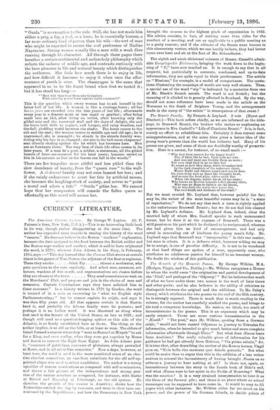CURRENT LITERATURE.
The American Caucus Sy•tem. By George W. Layton. (G. P. Putnam's Sons, New York, U.S.A.)—This is an interesting little book in its way, though rather disappointing at the same time. The author has expended some trouble in tracing the history of the word "caucus." He does not believe in the Boston " caulkers" explanation, because the date assigned to the feud between the British soldier and the Boston rope-walker and caulker, which is said to have originated the word, is 1770; whereas John Adams, in his diary, in February, 1764, says :—" This day learned that the Caucus Club meets at certain times in the garret of Tom Dower, the adjutant of the Boston regiment.
There they smoke drink flip choose a moderator, who puts questions to the vote regularly. And select men, assessors, col- lectors, wardens of five wards, and representatives are chosen before
they are chosen at the town They send committees to wait on the Merchants' Club, and propose and join in the choice of men and measures. Captain Cunningham says they have solicited him to these caucuses." In a history written in 1778 by Gordon, the word is treated of in a note as answering to " what we English style Parliamenteering ; " but he cannot explain its origin, and says it was then fifty years old. All that appears certain is that Boston bred it, and probably the Adams family were its parents ; and perhaps it is an Indian word. It was disowned as slang when first used in the Senate of the United States, as late as 1823 ; and though still used as a question-bogging epithet on this side of the Atlantic, is as firmly established here as there. The thing, as the author implies, is as old as the hills, or at least as man. The elders of Israel formed a caucus when they " went to Samuel at Mizpeh" to ask for a King, and even earlier, when they were got together by Moses and Aaron to concert the flight from Egypt. As John Adams puts it, "caucuses of patricians, caucuses of plebeians, always prevailed at Rome, and in all other free countries." Now a-days, however, at least here, the word is used in the more restricted sense of an elec- tive election committee, an excellent substitute for the old self-ap- pointed clique who used to select candidates. The author is a strong upholder of caucus nominations as compared with self-nominations, and draws a fair picture of the independence and strong posi- tion of the caucus nominee as compared, for instanoe, with Burke at Bristol and Macaulay at Edinburgh, on the old system. He sketches the growth of the caucus in America ; shows how the Federalists carried the day by caucuses, and were in their turn out- caucused by the Republicans ; and how the Democrats in New York
brought the caucus to the highest pitch of organisation in 1832. His advice consists, in fact, of nothing more than rules for the conduct of a meeting, and are as applicable to a public meeting as to a party caucus ; and if the citizens of the States want lessons in this elementary matter, which we can hardly believe, they had better come over here and sit at the feet of Mr. Schnadhorst.


































 Previous page
Previous page